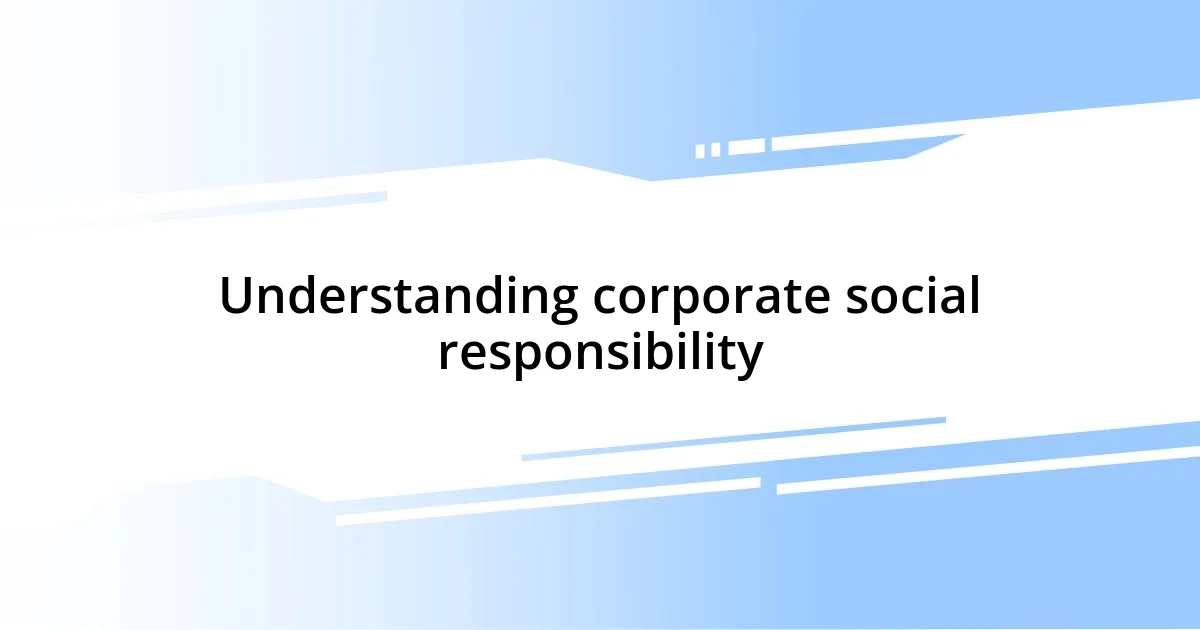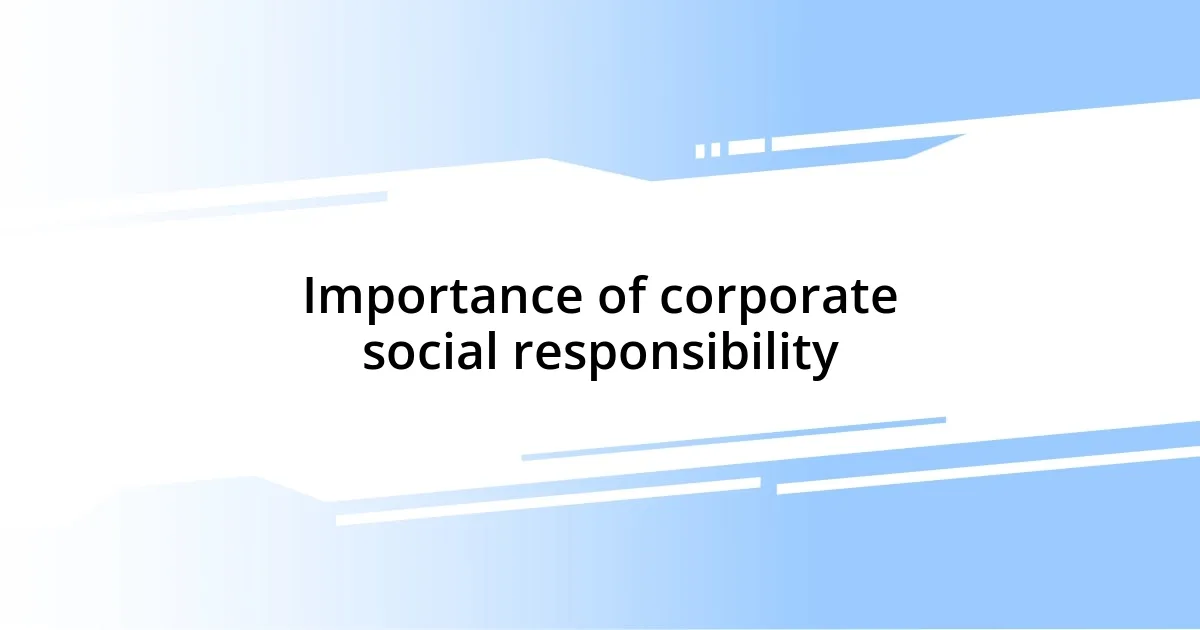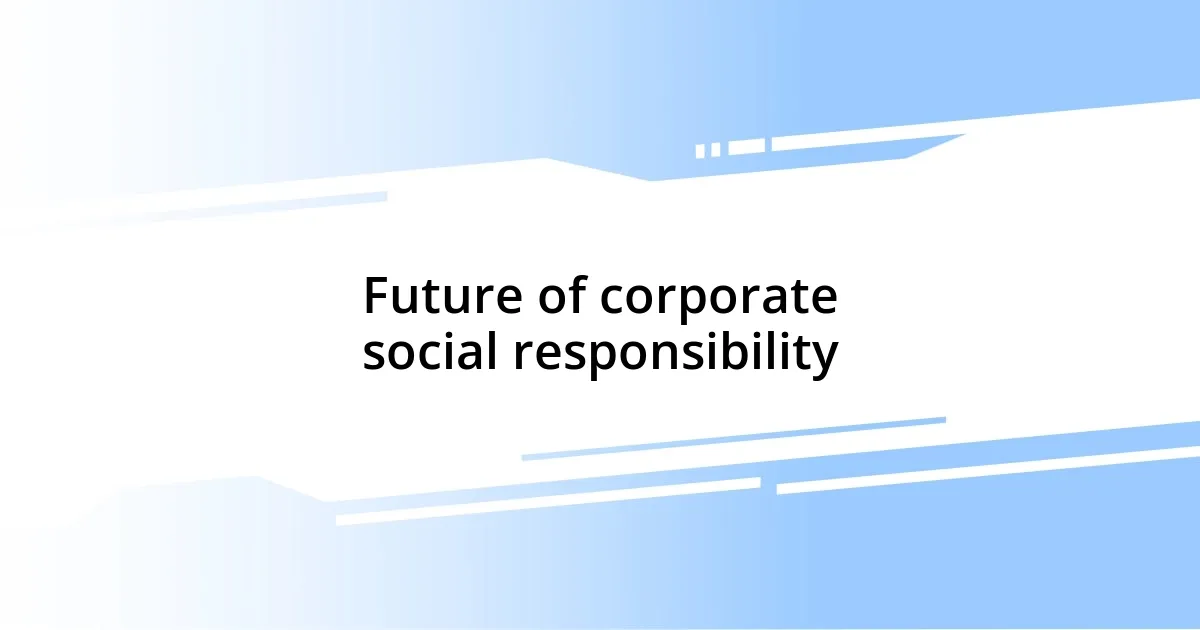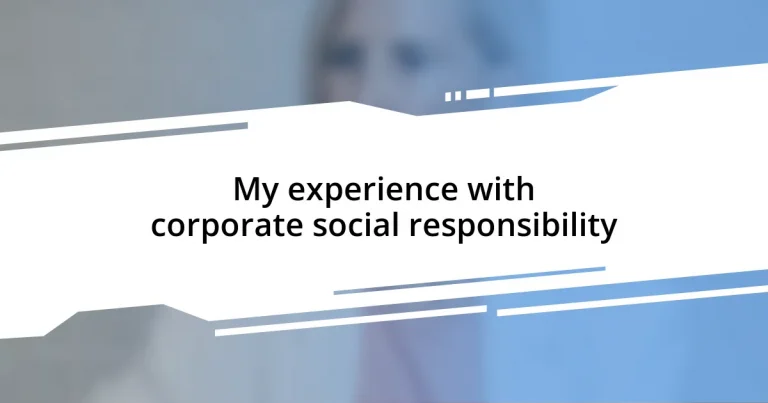Key takeaways:
- CSR transforms companies into respected institutions by prioritizing ethical practices alongside profits.
- Implementing CSR initiatives enhances reputation, attracts talent, fosters customer loyalty, and drives innovation.
- The future of CSR will focus on innovation and transparency, with an emphasis on data to measure social impact.
- Consumer awareness is increasing, making CSR an essential part of successful business strategies.

Understanding corporate social responsibility
Corporate social responsibility (CSR) is essentially a way for businesses to act ethically while making a profit. I remember sitting in a meeting where a colleague passionately argued about how our company could implement sustainable practices. It struck me how genuine concern for the community and environment can transform a company from just a profit-making entity into a respected institution.
When I think about CSR, I often ponder how it’s not merely a buzzword; it’s a commitment to making a difference. For example, I witnessed a local business dedicate a portion of its profits to educational initiatives for underprivileged children. That experience made me feel proud to support a company that values social contributions alongside its economic goals.
Have you ever wondered how a company’s actions impact the community around it? From my perspective, good CSR practices not only enhance a brand’s reputation but also create a stronger bond with customers. This relationship fosters loyalty and, ultimately, contributes to long-term success.

Importance of corporate social responsibility
The significance of corporate social responsibility (CSR) goes beyond mere compliance or branding; it’s about creating a lasting positive impact. I recall a time when our team organized a community clean-up day. Seeing my colleagues come together for a cause larger than ourselves not only strengthened our bonds but also reminded me of our shared responsibility toward creating a healthier environment. Such initiatives reinforce a company’s role as a responsible corporate citizen, ultimately benefiting everyone involved.
- Enhances company reputation: Responsible practices can improve public perception.
- Attracts and retains talent: Employees feel motivated working for a socially-conscious organization.
- Encourages customer loyalty: Customers are more likely to support brands with clear social values.
- Mitigates risks: CSR efforts can safeguard a company from public backlash.
- Fosters innovation: Businesses often discover new solutions and efficiencies when focusing on sustainability.
Through my journey, I’ve seen first-hand how implementing CSR initiatives generates not just goodwill, but also drives innovation. A moment that stands out in my mind was when our company embraced renewable energy projects; it felt as if we were stepping into the future while doing the right thing for our planet. This kind of forward-thinking not only aligns with ethical practices but also aligns with the expectations of today’s consumers.

Future of corporate social responsibility
The future of corporate social responsibility is undeniably linked to innovation and transparency. I remember attending a workshop where industry leaders discussed how technological advancements can streamline sustainability efforts. It made me realize that the next wave of CSR will likely involve businesses embracing data insights to measure their impact more effectively. How can companies truly claim to be socially responsible if they can’t back it up with solid data?
As I reflect on this, I can’t help but feel optimistic about the future. A memorable moment for me was when my company adjusted its supply chain to focus on ethical sourcing and fair trade practices. Seeing the positive reactions from customers and our community really highlighted the value of authenticity in CSR. It’s clear to me that the brands that will thrive in the coming years are those willing to engage deeply with their stakeholders and maintain ongoing dialogues about social impact.
Moreover, I believe that the expectations for companies will only continue to rise. People are becoming more aware and critical of corporate actions, which is a positive force driving change. I had a conversation with a close friend who works in marketing, and she emphasized how consumers are gravitating towards brands that align with their values. This trend suggests a future where CSR is not optional but a vital component of a successful business strategy. Isn’t that a compelling reason for companies to double down on their social missions?














